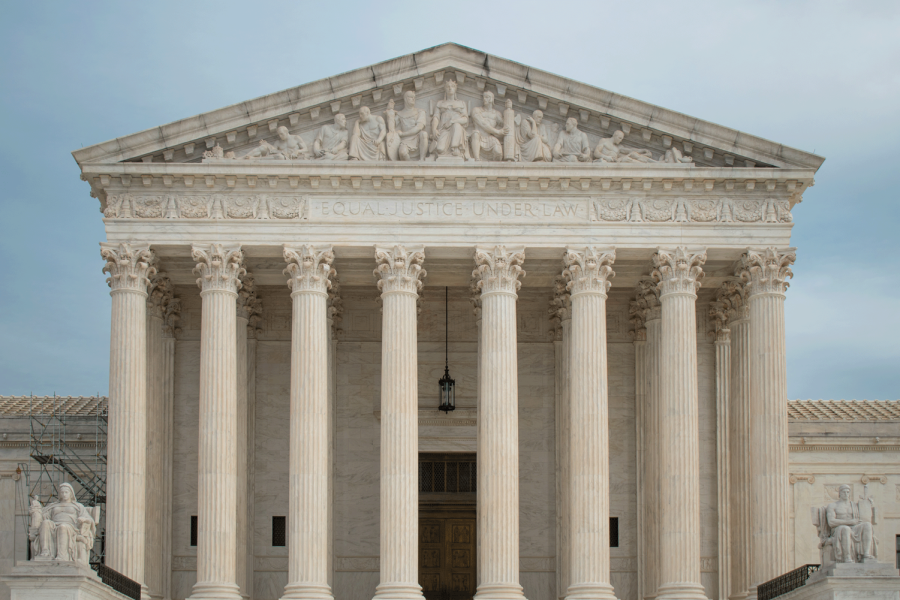Northwestern affirms commitment to diversity after SCOTUS strikes down affirmative action
Jacob Wendler/Daily Senior Staffer
The Supreme Court. Justices struck down affirmative action in a 6-3 decision Thursday.
June 29, 2023
Northwestern affirmed its commitment to diversity in a statement Thursday after the Supreme Court ruled 6-3 that affirmative action admission policies are unconstitutional.
The decision strikes down the use of race as a factor in college admissions processes. The case, Students for Fair Admissions. v. Harvard and University of North Carolina, is expected to have wide-reaching effects for universities across the country and overturn 45 years of precedent.
“Many universities have for too long wrongly concluded that the touchstone of an individual’s identity is not challenges bested, skills built, or lessons learned, but the color of their skin,” Chief Justice John Roberts wrote in the majority opinion. “This Nation’s constitutional history does not tolerate that choice.”
In a statement, University President Michael Schill said he is “deeply disappointed” by the court’s decision.
While the University will abide by the ruling, Schill said the majority opinion makes it harder for NU to achieve its goals.
“There is much to find problematic in the Court’s decision, but for me, among the most troubling elements is the doubt it casts on the importance of a diverse class in enhancing our educational mission,” Schill said.
Schill said that “for months,” Provost Kathleen Hagerty has worked with a group of University leaders including students, faculty and staff to discuss how to adapt NU’s practices to adhere with the then-potential decision.
In May, Schill said some admission practices NU will continue to affirm diversity at the undergraduate level include utilizing a holistic review of applicants, considering a permanent test-optional policy, strengthening partnerships with national organizations committed to college access, and offering digital tours and panels to students.
The University will continue working to develop additional policies to affirm and uplift diversity.
“None of these initiatives is successful in a vacuum, but combined, they contribute to an environment that attracts, welcomes and supports the brightest, most diverse students to our campuses,” Schill said. “If they prove ineffective, we will work collaboratively with our faculty and students to develop new initiatives until we succeed.”
Alvin Tillery, political science professor and director of the Center for the Study of Diversity and Democracy, said affirmative action only makes a noticeable difference in admissions at the top 100 schools in the U.S.
Most of the controversy around affirmative action, Tillery said, surrounds the test score gap between different races at these schools.
Some critics of affirmative action argue that White and Asian students are penalized by needing higher test scores, while Black, Indigenous and Latine students are unfairly helped despite having lower scores. But Tillery said this is not entirely accurate, and that some Asian and White students are actually benefited by the policy.
“This is a break from the reality in which college admissions work,” Tillery said. “The notion that you can’t use race for Black and Latino and Indigenous and poor Asian kids, but race is (still) used for white people in college admissions.”
When University of California schools struck down affirmative action in the 1990s, Tillery said the UCs saw a “precipitous” drop in White students being admitted.
At elite universities such as Harvard, approximately 30% of spaces are “encumbered” before admissions even start because of legacy admissions and athletics, Tillery said, two categories which primarily benefit white students.
“Because of the nature of our society in the middle of the twentieth century when affirmative action was put in place, we know that these two categories are filled with affluent white people,” Tillery said. “What are the knock-on effects of saying that you cannot use race at all in admissions? Does this mean we can no longer encumber students?”
Ronald Allen, John Henry Wigmore Professor of Law, said an interesting part of the opinion was that it does not bar the consideration of race if it makes a “verifiable” difference in a student’s experience.
Allen said that Universities will try to use this method where possible to preserve diverse incoming classes. This includes elements of holistic review that Schill said the University would continue to employ.
Paul Gowder, Pritzker professor and associate dean of research and intellectual life, said that this is a “narrow ruling.” The Supreme Court, according to Gowder, did not say anything about pipeline programs or building hospitable environments for people of non-majority backgrounds, for example.
“There are lots of ways that universities can still produce equity and inclusion, even after this decision,” Gowder said.
Email: [email protected]
Twitter: @nicolejmarkus
Related Stories:
— Legal experts say upcoming Supreme Court decisions could threaten diversity in universities


